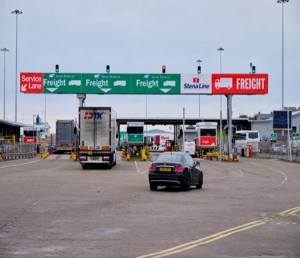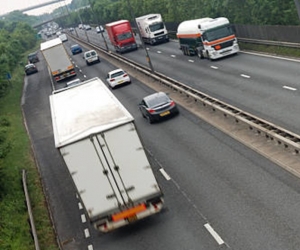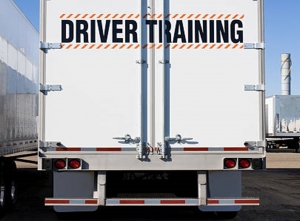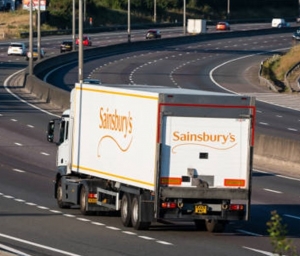Hauliers Demand Clarity on Holyhead Port Reopening
Haulage firms are calling for improved communication regarding the reopening of Holyhead, one of the UK’s busiest ports, which has been closed since Storm Darragh caused significant damage. Located in Anglesey, north Wales, the port is not expected to reopen until at least 15th January, causing severe disruption to the vital sea link between north Wales and Dublin.
Ger Hyland, president of the Irish Road Haulage Association (IRHA), highlighted the financial and logistical strain on hauliers, describing the closure as costly both in terms of money and drivers’ time. He criticised the lack of clear updates, saying: "If we’d known from the outset that the port wouldn’t be operational, we could have made plans and avoided losing five crucial days rerouting freight."
Holyhead typically handles 1,200 lorries and trailers daily and serves two million passengers annually. With ferry services suspended, alternative routes from Dublin to Liverpool, Heysham, Fishguard, and Belfast to Cairnryan have been implemented. However, the disruption has already impacted industries like postal services, with Ireland’s national post abandoning Christmas deliveries via Holyhead.
Plaid Cymru leader Rhun ap Iorwerth stressed the strategic importance of Holyhead and called for urgent collaboration between the Welsh and UK governments. Meanwhile, Irish Transport Minister Eamon Ryan assured stakeholders that securing alternative routes and resolving the Holyhead issue remains a priority, though hauliers warn delays could lead to layoffs and financial strain without additional support.
New Year Reminder for Drivers: Stay Safe Around HGVs
As the New Year begins and roads remain busy, motoring experts are reminding drivers to take extra care when overtaking heavy goods vehicles (HGVs) on motorways. Specialists from Smith Bros emphasised the importance of understanding HGV blind spots, stating: “HGVs have much larger blind spots than cars. If you can’t see the driver’s mirrors, they likely can’t see you either. Avoid staying in these areas for too long.”
They also advised drivers to give HGVs plenty of space when overtaking and avoid cutting back in too soon, as these vehicles require longer stopping distances, particularly in adverse weather or when navigating corners. Drivers were reminded of the specific speed limits for HGVs, which allow up to 50mph on single carriageways, 60mph on dual carriageways, and a maximum of 60mph on motorways for vehicles over 7.5 tonnes.
European regulations further require larger vehicles to have speed limiters capped at 56mph, ensuring they stay within national speed limits while allowing slight flexibility for overtaking or downhill driving. Despite these allowances, drivers should remember that speeding fines in the UK start at £100, along with three penalty points on their licence.
As we settle into the New Year, these reminders serve to encourage safer driving practices, ensuring all road users remain vigilant and cautious around larger vehicles.
Hydrogen Truck Plans for Wallsend Await Government Funding
Up to 80 hydrogen-powered trucks could be operating around Wallsend within five years if French-owned hydrogen producer Lhyfe secures government funding. The company has applied for support under the second Hydrogen Allocation Round (HAR), aiming to build a 20MW hydrogen production plant near Neptune Energy Park. The proposed facility, capable of producing eight tonnes of hydrogen daily, is contingent on government subsidies and planning approval.
Lhyfe, which operates green hydrogen plants across Europe, is targeting Wallsend as its first UK project. Boris Davis, head of business development for Lhyfe UK, said the country’s hydrogen strategy, introduced by former Prime Minister Boris Johnson, provides a strong foundation for development. If approved, the plant will use renewable electricity to power an alkaline electrolyser, with half its output supplied via pipeline to a neighbouring industrial user and the rest transported to a local haulier with a fleet of 80 trucks.
Davis highlighted the appeal of green hydrogen for operators unable to transition to battery electric vehicles due to grid limitations or operational requirements. However, he acknowledged the challenges of efficiency losses in hydrogen production, storage, and transport. The project will rely on renewable power purchase agreements to meet low-carbon criteria, although emissions are not entirely eliminated.
While the plant’s hydrogen production has clear demand, the by-product of pure oxygen currently lacks a buyer and would be released into the atmosphere. If approved, the facility is expected to begin operations in the latter half of the decade, supporting the UK’s transition towards cleaner transport solutions.
HGV Driver Numbers Surge Amid Recruitment Success
The UK has seen a significant rise in the number of HGV drivers, with figures from Logistics UK showing an increase of nearly 55,000 drivers in the past year – a growth of almost 21%. Targeted efforts to tackle the driver shortage, which worsened two years ago, are paying off, with 31,630 drivers under 35 joining the workforce between Q3 2023 and Q3 2024.
While the rise in younger drivers is encouraging, Logistics UK warns that the industry remains heavily reliant on older workers, with over 53% of drivers aged 50 or above. Bethany Windsor, head of skills policy at Logistics UK, highlighted the success of recruitment campaigns, improved pay, and government-backed training initiatives in addressing the workforce gap but cautioned that deeper challenges persist.
“It’s positive to see younger drivers entering the profession, but issues surrounding pay, working conditions, and ageing demographics need long-term solutions,” Windsor said. “Sustainable strategies, rather than focusing solely on headcounts, are key to tackling the sector’s challenges.” Windsor also praised initiatives like Generation Logistics for raising awareness and urged the government to extend funding for these programmes into 2025.
Logistics UK’s employment update revealed ongoing recruitment difficulties for skilled roles like technicians, with over half of businesses (51.8%) reporting severe shortages. Windsor called for a shift in public perception, positioning logistics as a viable, long-term career akin to retail or healthcare.
Henry Boot Launches £1bn Logistics Venture with Feldberg Capital
Henry Boot has announced a new partnership with Feldberg Capital to establish a specialist industrial and logistics development business. The joint venture, named Origin, is set to deliver £1 billion worth of projects over the next seven years. Henry Boot Developments (HBD) will hold a 25% stake in the business, which will initially be seeded with three sites from Boot’s existing pipeline, valued at £100 million.
Under the agreement, Henry Boot will act as the development manager, earning fees for its role, while Feldberg Capital takes on the position of investment manager. The collaboration will utilise HBD’s current pipeline of projects, while also seeking opportunities from third-party sites to support both pre-let and speculative industrial and logistics developments. Financing for each project will be secured through external lenders.
Tim Roberts, CEO of Henry Boot, highlighted the strategic importance of the venture, stating that the partnership with Feldberg Capital allows the firm to collaborate with a leading international investor while accelerating its £1.3 billion industrial and logistics pipeline. He added that this would enable Henry Boot to recycle capital more effectively, driving growth in a key sector for the business.
David Turner, managing partner at Feldberg Capital, described the timing as ideal for entering the market. He pointed to falling land values and more sustainable entry yields as creating an attractive investment environment. Structural trends such as the growth of e-commerce and increased onshoring by businesses are expected to provide ongoing momentum for the sector.
Eddie Stobart, Founder of Haulage Empire, Dies at 95
Edward Pears Stobart, the founder of one of Britain’s most iconic haulage businesses, passed away on 25 November 2024, aged 95. Born in Cumberland in 1929, Eddie began his career in farming before establishing a small agricultural enterprise in 1946, which later evolved into a renowned logistics company that shaped the UK haulage industry.
Eddie’s first lorry purchase in 1960 marked a turning point, and under his son Edward’s leadership from 1976, the business grew into a national transport empire. The Eddie Stobart brand became a household name, celebrated for its distinctive green-and-red livery and personalised truck names, becoming a symbol of British road haulage.
Despite the company’s success, Eddie maintained strong ties to his community and spent his later years quietly in Cumbria, supporting local businesses and preserving his farming roots. Known for his entrepreneurial spirit and dedication to quality, Eddie laid the foundations for a business legacy that continues to inspire British industry.
Eddie is remembered for his contributions to both the local economy and the national transport sector. He is survived by his family, who remain connected to the business’s success. Funeral arrangements will be private, in line with the family’s wishes, marking the end of an era for the Stobart family and British haulage.
RTITB Launches LGV/HGV Mentor Training to Boost Driver Retention and Safety
The RTITB (Road Transport Industry Training Board) has introduced a new LGV/HGV Driver Mentor course to support new drivers in refining their skills and learning best practices. This training aims to build confidence and competence on the road while addressing challenges around safety, talent attraction, and driver retention. Statistics show that employees with access to mentors are 35% less likely to leave their employer within the first year, highlighting the importance of mentorship in the logistics sector.
Laura Mack, Academy Manager at RTITB, emphasised the critical role mentors play in shaping new drivers’ habits and ensuring high safety standards. “The initial shifts for new drivers are vital for instilling a company’s culture and standards. Having a trained mentor with the right knowledge and communication skills is essential for providing proper support,” she said. While many companies assume experienced drivers can act as mentors, training ensures they are fully equipped to guide their colleagues effectively.
The two- or three-day LGV/HGV Driver Mentor course provides experienced drivers with skills to help new colleagues maintain safety and efficiency standards while progressing in their careers. Based on the European Mentoring and Coaching Council’s framework, the course covers communication techniques, delivering feedback, managing diversity, and supporting mentees in adhering to legal requirements.
Mentorship also benefits companies by improving driver retention, career progression, and job satisfaction. Trained mentors help build trust, address wellbeing concerns, and support professional development, making LGV/HGV driving a more appealing career choice. With the logistics industry continuing to face driver shortages, introducing mentorship programmes demonstrates a company’s commitment to supporting its workforce, enhancing its reputation as an employer of choice.
Amazon Launches Cutting-Edge Automated Warehouse in Shreveport
Amazon has unveiled its most advanced automated warehouse to date, integrating robotics and artificial intelligence (AI) throughout its 3-million-square-foot facility in Shreveport, Louisiana. Despite the cutting-edge technology, the site will still rely on a substantial human workforce, with over 1,400 employees already hired and plans to grow to 2,500. The new centre aims to streamline operations during the busy holiday season, balancing automation with human oversight to manage the physically demanding and repetitive tasks inherent in warehouse work.
The Shreveport facility features innovative robotic systems, including robotic arms and mobile units that transport shelves, enhancing speed and efficiency. However, some roles remain challenging to automate fully, as Amazon's vast product range - over 400 million items varying in size and fragility - requires a level of adaptability and precision that robots have yet to master. For now, robots bring storage bins to human workers, who identify, pick, and pack individual items for customers.
Safety improvements have been a key focus as the warehousing sector continues to face scrutiny over workplace injuries. Amazon has invested in technology to enhance safety and claims its automated roles are not only safer but also better paid than traditional warehouse jobs. The Shreveport site serves as a testbed for these innovations, which Amazon plans to expand to other facilities in the coming year.
While automation increases productivity, it also creates unique challenges requiring human intervention. Robots handle routine tasks, but human workers manage exceptions, load and unload trucks, and pack irregularly shaped orders. With the capacity to process one million orders daily, Amazon’s Shreveport facility highlights the evolving partnership between humans and machines in modern logistics.
Praise for Review of HGV Speed Limits on Scottish Roads
The Road Haulage Association (RHA) has welcomed the Scottish Government’s decision to consult on the National Speed Management Review, which includes proposals to raise the speed limit for heavy goods vehicles (HGVs) on single carriageway roads. Currently set at 40mph in Scotland, the proposed change would bring the limit in line with the 50mph limit already in place across England and Wales since 2015.
The RHA has long campaigned for this change, arguing it would reduce risky overtaking, improve road safety, and deliver environmental and economic benefits. A recent trial on the A9, where HGVs were permitted to travel at 50mph, demonstrated a decrease in dangerous overtaking and accidents, with evidence suggesting similar outcomes could be achieved across other Scottish single carriageways. The association also highlighted that lorries travelling at 50mph consume less fuel and produce fewer emissions, resulting in cost savings that could benefit consumers.
Martin Reid, the RHA’s Policy Director for Scotland, Wales, and Northern Ireland, praised the Scottish Government for exploring this issue. He noted that data from England and Wales shows no negative impact on safety, with a decade of evidence supporting the benefits of increased speed limits for HGVs.
IAM Roadsmart, a UK road safety organisation, also backed the proposals, citing research indicating that raising the HGV speed limit to 50mph has reduced accidents, injuries, and fatalities. They stressed that government policy should align with evidence, emphasising that safer, more efficient roads benefit everyone. Both organisations hope the consultation will lead to meaningful changes that improve road safety and support the transport sector.
Blue Yonder Ransomware Attack Disrupts Supply Chains
On 21 November, global supply chain software provider Blue Yonder suffered a ransomware attack, causing significant disruption to its managed services environment. The incident has had widespread repercussions for the company’s clients, which include major names such as Morrisons, Sainsbury’s, and Starbucks, highlighting the vulnerabilities in interconnected supply chain networks.
Based in Arizona, Blue Yonder is a leading provider of AI-driven supply chain solutions, supporting businesses with planning, fulfilment, delivery, and returns. Established in 1985, the firm serves over 3,000 clients across 76 countries, primarily within the retail, manufacturing, and logistics sectors. In a statement following the attack, Blue Yonder confirmed that external cybersecurity experts were assisting with their recovery efforts. While progress is being made, the company has yet to provide a timeline for full restoration.
The fallout has been felt keenly by major supermarkets and FMCG suppliers in the UK and US. Starbucks reported disruptions to staff payment and scheduling systems due to backend issues, while UK retailers such as Sainsbury’s and Morrisons also faced operational challenges. Sainsbury’s assured that contingency plans were in place, but customers reported gaps in Morrisons’ shelves, prompting frustration on social media. Morrisons clarified that frozen and ambient products were unaffected and that backup systems were ensuring continuity.
With the Christmas trading season underway, the timing of the attack has amplified its impact. Blue Yonder’s UK clients, including Tesco, Waitrose, and Asda, are also closely monitoring developments. The situation underscores the critical need for robust cybersecurity measures to protect supply chain infrastructure, which is essential to ensuring reliable service for businesses and customers alike.















